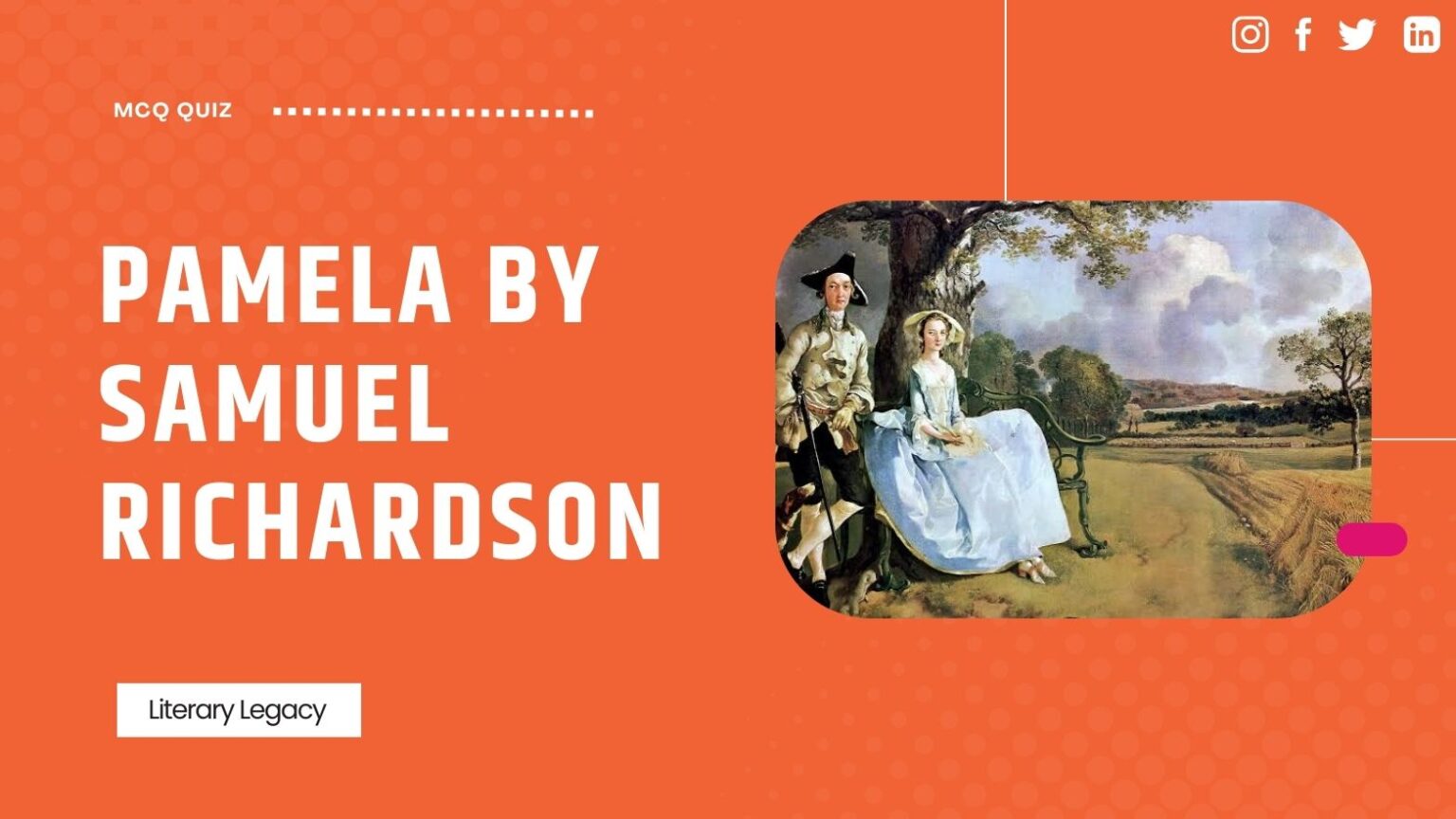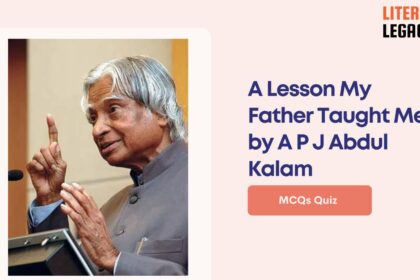1. What motivates Mr.B to have Mr.Williams robbed and jailed?
A) He wants to take Mr.Williams’s money.
B) He believes Mr.Williams is a bad influence on Pamela.
C) He plans to get rid of all of Pamela’s friends.
D) He is jealous of Mr.Williams’s closeness to Pamela.
Answer: (D)
He is jealous of Mr.Williams’s closeness to Pamela.
Mr.B feels jealousy toward Mr.Williams because of his relationship with Pamela.
2. How does Mr.B initially disguise himself to get close to Pamela?
A) As a visiting nobleman.
B) As a gardener.
C) As a traveling merchant.
D) As a maid named Nan.
Answer: (D)
As a maid named Nan.
Mr.B impersonates a maid named Nan to gain access to Pamela.
3. What reaction does Mr.B have upon reading Pamela’s journal pages?
A) He is furious and threatens her.
B) He ignores them completely.
C) He feels moved and not angry at all.
D) He demands she write more flattering entries.
Answer: (C)
He feels moved and not angry at all.
Mr.B shows a surprising lack of anger and is moved by the content of Pamela’s journal.
4. What condition does Pamela have about marrying Mr.B?
A) He needs to show he can win the approval of the local gentry.
B) He should first get rid of his family’s cluttered chapel.
C) He must prove he loves her by helping Mr.Williams.
D) He must repay all debts incurred during their correspondence.
Answer: (B)
He should first get rid of his family’s cluttered chapel.
Pamela suggests that Mr.B clean out his family’s chapel for their wedding.
5. What does Pamela do with the money she obtains after marrying Mr.B?
A) Uses most of it for charity.
B) Invests it in a business.
C) Throws a lavish party for the gentry.
D) Saves it for herself and her family.
Answer: (A)
Uses most of it for charity.
Pamela uses her money primarily for charitable purposes and helping others.
6. How does Pamela respond to learning about Mr.B’s child with Sally Godfrey?
A) She refuses to acknowledge the child.
B) She agrees to adopt the child.
C) She becomes resentful and untrusting.
D) She demands a divorce immediately.
Answer: (B)
She agrees to adopt the child.
Pamela shows acceptance by proposing to adopt Mr.B’s child as their own.
7. What social challenge does Pamela face after marrying Mr.B?
A) Some gentry, including Lady Davers, struggle to accept her.
B) She is shunned by all her old friends.
C) She cannot find a place in Mr.B’s family.
D) She is unable to manage Mr.B’s estate.
Answer: (A)
Some gentry, including Lady Davers, struggle to accept her.
Pamela has to earn the acceptance of the local gentry after her marriage.
8. What role is Pamela recommended to take after Lady B’s death?
A) A library maid
B) A servant for Mr. B
C) A governess for children
D) A servant for Lady Davers
Answer: (B)
A servant for Mr. B
Pamela is recommended to work for Mr. B by Lady B as her final wish.
9. What does the Editor summarize about Pamela in the epilogue?
A) She regretted her choices and wished for a different life.
B) Her marriage was a façade based on deception.
C) She lost her virtue in her pursuit of happiness.
D) She is a role model for others to follow.
Answer: (D)
She is a role model for others to follow.
The Editor concludes that Pamela serves as a role model with strong moral values.
10. What does Mr.B do to try to prove his sincerity to Pamela?
A) He hosts Pamela’s father at the estate.
B) He travels to London to seek a noble title.
C) He throws a ball for the local gentry.
D) He gives away his fortune to the needy.
Answer: (A)
He hosts Pamela’s father at the estate.
Mr.B invites Pamela’s father to show his commitment and sincerity.
11. What does Pamela send home to her parents after starting her new job?
A) A dress made by Lady B
B) Four guineas and silver
C) A diamond ring
D) A letter of resignation
Answer: (B)
Four guineas and silver
Pamela sends four guineas and some silver from Lady B’s pocket to help with her parents’ debts.
12. What does Mr. B do that makes Pamela feel threatened?
A) He refuses to pay her wages.
B) He makes aggressive advances and kisses her without consent.
C) He dismisses her from her duties.
D) He takes her to a ball against her will.
Answer: (B)
He makes aggressive advances and kisses her without consent.
Mr. B’s aggressive advances towards Pamela put her in a threatening situation.
13. What previous history does Mr.B have that complicates his relationship with Pamela?
A) He has a former girlfriend who disapproves of their marriage.
B) He was previously married to another woman.
C) He was once a criminal hiding from law enforcement.
D) He has a child with another woman.
Answer: (D)
He has a child with another woman.
Mr.B’s past involvement with Sally Godfrey and their child adds complexity to his relationship with Pamela.
14. Why does Pamela decide to return home?
A) To confront Mr. B about his behavior.
B) To help her parents with their debts.
C) To escape the advances of Mr. B.
D) To ask for permission to marry Mr. Williams.
Answer: (C)
To escape the advances of Mr. B.
Pamela decides to return home to get away from Mr. B’s aggressive behavior and preserve her virtue.
15. What does Mr. B claim he wants to do with Pamela?
A) Make her his housekeeper.
B) Send her to school.
C) Marry her off to his chaplain.
D) Marry her immediately.
Answer: (C)
Marry her off to his chaplain.
Mr. B claims he wants to marry Pamela off to his chaplain, Mr. Williams.
16. What role does John play in Pamela’s situation?
A) He delivers her letters without reading them.
B) He aids her escape.
C) He secretly follows Mr. B’s orders.
D) He reports her behavior to Lady Davers.
Answer: (C)
He secretly follows Mr. B’s orders.
John follows Mr. B’s orders and shows him some of Pamela’s letters while leaving a few undelivered.
17. How does Pamela find herself trapped at Mr. B’s estate?
A) She is blackmailed by Mr. B.
B) She is betrayed by Mrs. Jervis.
C) She is physically locked in a room.
D) She is deceived into taking a coach to Lincolnshire.
Answer: (D)
She is deceived into taking a coach to Lincolnshire.
Pamela is tricked into taking a coach that takes her to Mr. B’s Lincolnshire estate instead of home.
18. Who is Mrs. Jewkes in relation to Pamela?
A) A cruel overseer who watches over her.
B) A fellow servant helping her escape.
C) Pamela’s mentor.
D) Her best friend.
Answer: (A)
A cruel overseer who watches over her.
Mrs. Jewkes is a cruel overseer at Lincolnshire who keeps a close watch on Pamela and restricts her freedom.
19. What does Pamela begin to use instead of letters to communicate her thoughts?
A) Secret notes hidden in the kitchen.
B) A diary.
C) Conversations with Mr. Williams.
D) Messages through Mrs. Jervis.
Answer: (B)
A diary.
Pamela begins keeping a journal to express her thoughts and feelings while at Lincolnshire.
20. What is Mr. Williams’ relationship with Mr. B?
A) He is dependent on him for his livelihood.
B) He is his rival for Pamela’s affections.
C) He is a family friend.
D) He is unaware of Mr. B’s actions.
Answer: (A)
He is dependent on him for his livelihood.
Mr. Williams is dependent on Mr. B for his living but is still willing to help Pamela escape.
21. What does Pamela primarily hope to preserve by leaving Mr.B’s estate?
A) Her virtue
B) Her friendship with Mrs. Jervis
C) Her wealth
D) Her social status
Answer: (A)
Her virtue
Pamela is determined to maintain her virtue in the face of Mr.B’s advances.
22. What initially brings Pamela joy in her new position with Mr.B?
A) The promise of a new job with Lady Davers
B) The salary she received from Mr.B
C) The friendship with other servants
D) Her ability to write letters
Answer: (C)
The friendship with other servants
Pamela takes a liking to the other servants, especially Mrs. Jervis.
23. What does Mr.B force Pamela to do while at his Lincolnshire estate?
A) Endure the presence of Mrs.Jewkes
B) Write acceptance letters
C) Attend social gatherings with his friends
D) Seek permission to marry Mr.Williams
Answer: (A)
Endure the presence of Mrs.Jewkes
Pamela must endure the cruel treatment from Mrs.Jewkes, who controls many aspects of her confinement.
24. How does Pamela attempt to communicate with her parents after being denied letters?
A) Through conversations with Mrs.Jewkes
B) By creating drawings
C) By sending messages through Mr.Williams
D) By keeping a journal
Answer: (D)
By keeping a journal
Pamela begins to keep a journal to express her thoughts and experiences.
25. What role does Mr.Williams play in Pamela’s life during her confinement?
A) He is another servant in Mr.B’s household
B) He becomes her husband
C) He is complicit in Mr.B’s plans
D) He assists Pamela in her escape plans
Answer: (D)
He assists Pamela in her escape plans
Despite his situation, Mr.Williams is willing to help Pamela escape from Mr.B.
26. What false claim does Mr.B make regarding Pamela’s future?
A) He plans to give her a substantial inheritance
B) He will allow her to return home
C) He intends to send her to Lady Davers
D) He wants to marry her
Answer: (C)
He intends to send her to Lady Davers
Mr.B continually promises Pamela a future working for his sister, which never materializes.
27. What deceptive action does John take concerning Pamela’s letters?
A) He delivers them but alters their content
B) He shows some to Mr.B
C) He sends them to Lady Davers instead
D) He returns them unopened
Answer: (B)
He shows some to Mr.B
John follows Mr.B’s orders by revealing some of Pamela’s correspondence to him.
28. What does Mr.B suggest he wants to do concerning Pamela’s marriage?
A) Arrange a marriage with himself
B) Promote her for a marriage to Lady Davers’ son
C) Send her away to marry a wealthy suitor
D) Have her marry Mr.Williams
Answer: (D)
Have her marry Mr.Williams
Mr.B claims that he wants to arrange Pamela’s marriage to Mr.Williams.
29. What condition does Mr.B impose on Pamela regarding her departure?
A) She cannot speak to Lady Davers again
B) She must repay the money given to her parents
C) She cannot tell anyone about her time at the estate
D) She must marry Mr.Williams first
Answer: (D)
She must marry Mr.Williams first
Mr.B uses the condition of marrying Mr.Williams as a means to restrict Pamela’s freedom.
30. How does Pamela feel about her role in Mr.B’s household initially?
A) Angry at her situation
B) Conflicted and unhappy
C) Content and grateful
D) Jealous of the other servants
Answer: (C)
Content and grateful
Pamela is initially overjoyed and feels grateful for her new position in the household.
31. What does Pamela do when Mr.B expresses jealousy towards Mr.Williams?
A) She ignores Mr.B’s behavior.
B) She agrees to keep her distance from Mr.Williams.
C) She encourages Mr.B’s jealousy.
D) She helps Mr.B plan the robbery of Mr.Williams.
Answer: (B)
She agrees to keep her distance from Mr.Williams.
Pamela realizes the risks of Mr.B’s jealousy and takes steps to protect herself.
32. How does Pamela first perceive Mr.B upon her return to his estate after her trip?
A) As an unchanged libertine.
B) As a victim of circumstance.
C) As a deceptive trickster.
D) As a kinder and more earnest man.
Answer: (D)
As a kinder and more earnest man.
Upon returning, Pamela finds Mr.B to be significantly kinder and earnest about their relationship.
33. What is the primary significance of virtue in the narrative of Pamela?
A) It solely leads to personal happiness.
B) It is closely associated with maintaining sexual purity.
C) It serves as a tool for manipulation.
D) It functions as a social status indicator.
Answer: (B)
It is closely associated with maintaining sexual purity.
The concept of virtue in the novel often revolves around Pamela’s efforts to maintain her virginity.
34. What is Pamela’s belief regarding sex in relation to marriage?
A) Only after marriage should one engage in sexual relations.
B) Sex should be enjoyed freely.
C) It has no bearing on marriage.
D) It is acceptable under certain circumstances.
Answer: (A)
Only after marriage should one engage in sexual relations.
Pamela believes that sex should only occur after marriage, which brings her into conflict with Mr.B.
35. How does Pamela ultimately gain acceptance among the local gentry after her marriage?
A) Using her virtue and beauty.
B) Through threats and intimidation.
C) By showcasing her family’s wealth.
D) By distancing herself from lower-class individuals.
Answer: (A)
Using her virtue and beauty.
Pamela’s virtue and beauty help her gain acceptance from the local upper-class society.
36. What type of social class prejudice does Lady Davers represent in the story?
A) Acceptance of lower-class individuals.
B) Support for marriage across classes.
C) Old-fashioned views against lower-class marriages.
D) Encouragement of class mixing.
Answer: (C)
Old-fashioned views against lower-class marriages.
Lady Davers embodies the prejudices of the upper class against lower-class individuals marrying into their ranks.
37. What challenge does Pamela’s marriage to Mr.B face after its initial happiness?
A) The gentry’s acceptance begins to fade.
B) Mr.B reveals a previous child from another relationship.
C) Mr.B’s health becomes an issue.
D) Conflict arises over wealth distribution.
Answer: (B)
Mr.B reveals a previous child from another relationship.
Pamela learns about Mr.B’s child from a previous relationship, which presents a challenge to their marriage.
38. What motivates Pamela to return to Mr.B after initially deciding to leave him?
A) A longing for a life of luxury.
B) A desire for wealth and status.
C) Feeling pity for Mr.B’s situation.
D) She realizes she might find Mr.B handsome and does not hate him.
Answer: (D)
She realizes she might find Mr.B handsome and does not hate him.
Pamela comes to the realization that she does not hate Mr.B and may even find him attractive, prompting her return.
39. What is a central theme explored in Pamela regarding societal structure?
A) The advantages of being lower class.
B) The fairness of the ruling elite.
C) The decline of upper-class morals.
D) Morality varies between classes.
Answer: (D)
Morality varies between classes.
The novel explores how virtue is rewarded differently across social classes, showing that wealth does not always equate to morality.
40. How does Pamela’s character evolve in terms of class acceptance after her marriage?
A) She gradually becomes a respected member of society.
B) She remains indifferent to societal norms.
C) She fights against her lower-class origins.
D) She avoids upper-class individuals.
Answer: (A)
She gradually becomes a respected member of society.
Pamela evolves to become a respected member of society, overcoming class prejudices.



